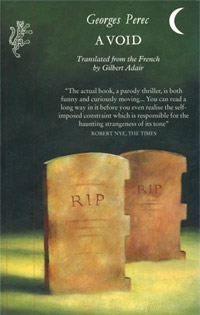A Void

Cover of the English translation of La Disparition
|
|
| Author | Georges Perec |
|---|---|
| Original title | La Disparition |
| Translator | Gilbert Adair |
| Country | France |
| Language | French |
| Publisher |
Gallimard (orig.) The Harvill Press (Eng. trans.) |
|
Publication date
|
1969 |
|
Published in English
|
1995 |
| Media type | Print (Hardcover, Paperback) |
| Pages | 290 pp (Eng. trans. Hardcover) |
| ISBN | (Eng. trans. Hardcover) |
| OCLC | 31434932 |
A Void, translated from the original French La Disparition (literally, "The Disappearance"), is a 300-page French lipogrammatic novel, written in 1969 by Georges Perec, entirely without using the letter e (except for the author's name), following Oulipo constraints.
It was translated into English by Gilbert Adair, with the title A Void, for which he won the Scott Moncrieff Prize in 1995. Three other unpublished English translations are titled A Vanishing by Ian Monk, Vanish'd! by John Lee, and Omissions by Julian West.
The book has also been translated into German (by Eugen Helmlé as Anton Voyls Fortgang, 1986), Italian (by Piero Falchetta as La scomparsa, 1995), Spanish (by Hermès Salceda as El secuestro, 1997), Swedish (by Sture Pyk as Försvinna, 2000), Russian (by Valeriy Kislow as Исчезание [Ischezanie], 2005), Turkish (by Cemal Yardımcı as Kayboluş, 2006), Dutch (by Guido van de Wiel as 't Manco, 2009), Romanian (Serban Foarta as Disparitia, editura Art, 2010), Japanese (by Shuichirou Shiotsuka as 煙滅 [Emmetsu], 2010) and Croatian (by Vanda Mikšić as Ispario, 2012).
All translators have imposed upon themselves a similar lipogrammatic constraint to the original, avoiding the most commonly used letter of the alphabet. This precludes the use of words normally considered essential such as je ("I"), et ("and") and le (masculine "the") in French, and "me" and "the" in English. The Spanish version contains no a, which is the most commonly used letter in the Spanish language ("e" being second), while the Russian version contains no о.
A Void's plot follows a group of humans looking for a missing companion, Anton Voyl. It is in part a parody of noir and horror fiction, with many stylistic tricks, gags, plot twists, and a grim conclusion. On many occasions it implicitly talks about its own lipogrammatic limitation, highlighting its unusual orthography. By and by, protagonists within A Void work out which symbol is missing, but find it a risky topic to discuss, as any who try to bypass this story's constraint risk fatal injury. Philip Howard, writing a lipogrammatic appraisal of A Void in his column Lost Words, said "This is a story chock-full of plots and sub-plots, of loops within loops, of trails in pursuit of trails, all of which allow its author an opportunity to display his customary virtuosity as an avant-gardist magician, acrobat and clown."
...
Wikipedia
